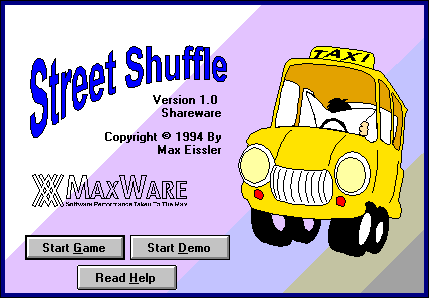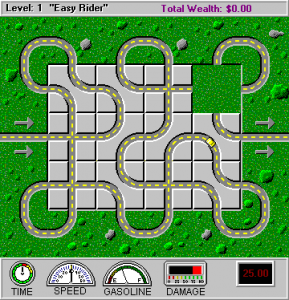Street Shuffle 
Can a game’s loveability cancel out its problems? Street Shuffle‘s little roads and taxi argue, emphatically, yes.
Street Shuffle predicts a future world of automated traffic where highways reconfigure to ensure efficient travel for all. You play as a cab driver who wants to wring some extra cash out of customers and hacks their taxi to control the roads manually to form longer routes. This never really matters, though it cheekily justifies the game’s puzzles. Each level consists of a map of sliding road tiles you can mix up like a 15-puzzle to guide your taxi to the exit. Longer trips award higher fares, which you can spend between levels to refuel, repair your cab’s damage, or buy special equipment for riding on troublesome streets. Occasionally, you’ll reach a bonus level where you place tiles to build the lengthiest road possible for bonus cash.
The sliding puzzles are pretty fun and hard to stop playing once you adjust to their demands, but the game plants its deepest hooks with its adorable style. Rather than run with the dystopian theme implied in the story, Street Shuffle looks like a toy car playmat. Your tiny, stubby taxi scoots down the road a pokey speed while “Entrance of the Gladiators” pipes in the background, and oh my god, is it so precious. The simple and charming appearance works gangbusters. As the game’s fifty stages escalate in difficulty, the challenge stays playful, like a juggler throwing more clubs into the air.
The game’s greatest oversight surfaces in the cab management aspects that pop up between rounds. You’ll need to refuel every so often, and you can optionally pay a large sum to fix up your cab after a crash – essentially buying an extra life. This lets you play longer but saps your earnings, a major disadvantage when you need buy tools for dealing with ice or dirt roads. Basically, if you’re not great at Street Shuffle, you have to make bigger sacrifices. (That also, hilariously, reflects the real problems with wealth inequality: without enough money, you’ll miss further opportunities to succeed.)
So if you earn less, you need to spend more. This frustratingly snowballs at some point. On the other hand, come on, look at that cute little taxi. I’m willing to forgive plenty of issues in appreciation of the game’s buoyancy. Ignore those troublesome finance bits, and enjoy watching your itty-bitty car drive in circles.


